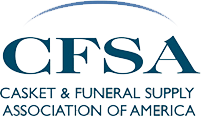The June 2015 issue of ICCFA Magazine included an interesting series of interviews of selected CFSA-member companies done by the magazine’s managing editor, Susan Loving (sloving@iccfa.com). Here is an excerpt.
The rising cremation rate affects not only funeral homes and cemeteries but also the suppliers who provide the products they sell. How are casket companies responding to the continuing increase in cremation?
Some things that affect funeral and cemetery service, such as the state of the economy, fluctuate over time. But one thing that has been on a steady course for decades is the cremation rate. The economy goes up and then down again, but the cremation rate moves in only one direction, rising inexorably. How is this affecting the business of selling caskets? ICCFA Magazine talked to representatives of a number of casket manufacturers exhibiting at the 2015 ICCFA Annual Convention & Exposition about how the rising cremation rate is affecting the industry in general and their businesses in particular.
We now make a lot more cremation-type products, but we still do business with a lot of the large casket manufacturers. So we can kind of judge a little bit about how the casket industry is doing based on our sales of our Vandor Corp. products. We notice that, for example, a company that has bought a certain number of casket inserts for years has decreased its order.
When I started working with Vandor in 1998, before Starmark even existed, we ran two shifts – we were running all the time. Now we run one shift; that work has slowly declined. Fortunately, Vandor’s management was keeping an eye on those trends. When you watch the cremation rate rise and the burial rate drop, you know you’re not always going to be making interior components for other companies.
So in 2005, we started Starmark. Our president, Gerald Davis, was co-founder of Elder Davis Inc. When that business was sold, it probably had the highest cremation market share in the United States.
Today, the cremation rate is rising in a different way. The low-end side has been steadily increasing, and we’ve had to look at how we market our products. We make some
low-end products, but our main focus is trying to get funeral directors to think about cremation not as a volume business, but in terms of getting back into the service business like they have done with burial families all these years.
Using rental or clothcovered caskets is a trend for cremation. Funeral directors are getting more service-oriented: “Do you plan on having a visitation before cremation?” We’re seeing more of that.
Our rental insert sales are great. We’re definitely seeing a trend toward a rental casket system that gives funeral directors an opportunity to offer a whole package [like] they usually would for burial families. People see a casket that looks like it’s going to be buried, but after the service, the insert comes out and goes to the crematory. That’s basically a traditional funeral, but with body disposition being cremation instead of burial, and we’re just seeing that every day. And all markets are different; the charge for a basic cremation varies widely.
We tell funeral directors that what we’re suggesting isn’t going to work for everybody – but it’s going to work for a lot of people. We’ve had funeral directors call and say, “The best thing I’ve done since I’ve been in the funeral industry is stop selling the plain cardboard box for cremation.” Families say, “We didn’t know all these options were available” – because no one ever told them.
I think this trend is going to continue; it’s definitely not a fad, and we think we have the right product.
 Dave Hazelett, Astral Industries: Cremation can be immediate disposition or it can be a disposition with a memorial service. Funeral directors are taking the opportunity to show families how celebrating a life lived can be done with cremation; cremation doesn’t have to be a detriment to the funeral industry.
Dave Hazelett, Astral Industries: Cremation can be immediate disposition or it can be a disposition with a memorial service. Funeral directors are taking the opportunity to show families how celebrating a life lived can be done with cremation; cremation doesn’t have to be a detriment to the funeral industry.Cremation families are looking for a different kind of product than burial families. Astral Industries’ key role is to produce caskets for families who don’t want to spend money on thick metal caskets that have gaskets and locks. They just want something to display the remains in a dignified, beautiful way – that’s where our strength is. Families can afford to buy our caskets and still have a great memorial service for their loved one.
I’m in my 42nd year with Astral. We feel that America today is looking for a different kind of casket than America prior to 2008, when families came in with insurance policies and bought complete funerals with embalming, vaults, and expensive caskets.
Today families don’t buy insurance policies like they used to. Families are coming in with members out of work, upside down on their mortgages, with less disposable income. So families are looking for eye appeal and price, with a memorial service that celebrates a life lived. The funeral homes that are making that transition are doing well and growing.
We have changed our product. We used to follow the typical casket company methodology of having caskets look better by offering such things as gaskets and locking devices and thicker metal. No one who buys an automobile has any idea how thick the steel is. The automotive industry has never told America what gauge steel is on the door that protects your grandchildren riding in the back seat.
As we realized America can’t afford expensive funerals any longer, we started producing caskets with great eye appeal and low price.
 Tom Warner, Sauder Funeral Products: Our product works well for either burial or cremation, but we definitely the last couple of years have focused more on the product development side on cremation, knowing that is obviously growing.
Tom Warner, Sauder Funeral Products: Our product works well for either burial or cremation, but we definitely the last couple of years have focused more on the product development side on cremation, knowing that is obviously growing.The other thing that we’re trying to do with our product is give families an opportunity for a low-cost memorial service or viewing. We offer caskets with a price point that typically has been limited to clothcovered caskets – our caskets are engineered wood with a decorative laminate veneer. We’re trying to give funeral directors and families opportunities for something other than a cloth-covered corrugated casket.
We’re fairly new in the business; we’ve been at this about eight years. We’re a furniture company by trade, but this is a good fit for us. Our parent company, Sauder Woodworking, makes ready-to-assemble furniture. We were looking for other opportunities that would fit our manufacturing process, and this one got us totally away from furniture, but we could use our existing equipment.
We believe we’re at the right place at the right time for this industry because of families spending less on caskets. And we believe when they do that, there are opportunities for them to spend some of those saved dollars on the memorial side of things, whether it be the celebration after the funeral or the burial.
When we first got into this, we went to a local supplier that was going to do some interiors for us, and they said, “Are you sure you want to do this? Anytime the furniture industry gets slow, it seems like they all want to get into the casket industry.” That’s why we didn’t go at it in a big way to start out, but we really believe now that there is a market for our product.
I think sometimes families need to be educated about their options, on ways they can hold down costs but still have a service, an opportunity to grieve. Too many times, I think because of cost people go with cremation and don’t understand they could still have something, even a viewing. There are definitely opportunities in this industry to serve cremation families differently in the future.
Our furniture is ready to assemble, so our first idea was to make a casket that was ready to assemble so the funeral director could store them in a carton and pull them out as needed. We found out very early on that funeral directors don’t have time and don’t want to mess with assembling a casket.
If you read about how to develop a new market, most experts will say you should accept that your first idea is going to be wrong, and our ready-to-assemble casket idea was wrong. But we went back and reengineered the product.
Today, we’re pleased with the growth we’ve seen. We’ve learned in this industry that you just have to be patient. You have to earn people’s respect and confidence, and I believe we’ve done that and funeral directors are starting to understand who we are.

